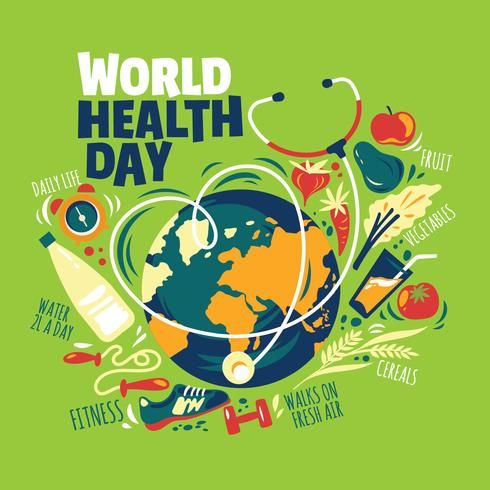World Health Day: A Powerful Reminder to Prioritize Our Well-being
Introduction
World Health Day, celebrated every year on April 7th, is a global event aimed at raising awareness about health issues that impact people worldwide. It serves as a reminder to prioritize health, adopt healthy lifestyles, and advocate for improved health services. As we face global health challenges such as pandemics, mental health issues, and access to healthcare, World Health Day continues to be a significant platform for promoting well-being and taking action to improve global health.
World Health Day is organized by the World Health Organization (WHO), and each year, the event is centered around a specific theme related to global health challenges. Whether it’s about tackling non-communicable diseases, promoting mental health awareness, or addressing healthcare access inequalities, World Health Day provides an opportunity for individuals, governments, and organizations to reflect on the state of global health and work together to create a healthier future.
What is World Health Day?
It is a day dedicated to promoting good health worldwide and addressing the most pressing health issues. The purpose of this day is to raise awareness about health challenges, educate people on health matters, and encourage them to adopt healthier lifestyles. The day is observed by millions of people through health initiatives, public events, educational programs, and policy advocacy.
Each year, World Health Day highlights a particular global health issue. Past themes have included topics like universal health coverage, mental health, health inequality, and climate change and health. The theme chosen by WHO is intended to spark conversations, increase knowledge, and inspire action that improves global health outcomes.
History of Day
The origins of World Health Day trace back to the founding of the World Health Organization (WHO) on April 7, 1948. The WHO was established to address global health challenges and promote the overall well-being of individuals worldwide. The first World Health Day was celebrated in 1950 to mark the anniversary of WHO’s founding, and since then, the observance has grown into a powerful international event.
Throughout the years, World Health Day has played a key role in highlighting important health issues, including eradication of diseases, health care access, and the promotion of public health. The day is celebrated in numerous ways, from global health campaigns to local events, and has influenced policy changes, inspired community health programs, and raised awareness about pressing health concerns.
Key Facts About Day
- It’s Celebrated Every Year on April 7th: World Health Day is observed annually on April 7th, the anniversary of the founding of the World Health Organization (WHO) in 1948.
- Themes Change Every Year: Each year, the theme of World Health Day is carefully selected by WHO to address a specific global health challenge. Themes from recent years have included mental health, universal health coverage, and climate change and health.
- Global Participation: World Health Day is celebrated worldwide, with people from all corners of the globe participating in events, campaigns, and initiatives designed to promote health and raise awareness.
- Focus on Specific Health Issues: The day focuses on a variety of health topics such as non-communicable diseases (e.g., heart disease, diabetes), mental health, vaccination, and health disparities between different populations.
- Influence on Policy and Health Programs: It is often the catalyst for health-related policy changes and the implementation of new public health programs, particularly in areas with limited access to healthcare.
Why is Day Important?
1. Raising Awareness About Global Health Issues
One of the most crucial aspects of World Health Day is its ability to shine a spotlight on global health challenges. Each year, a specific health issue is chosen as the focus of the day, such as improving access to health care, addressing mental health stigma, or reducing health inequalities. By raising awareness of these issues, World Health Day fosters a sense of responsibility and encourages individuals to take action in their communities.
2. Promoting Healthy Lifestyles
World Health Day serves as a reminder to prioritize healthy living. It encourages individuals to adopt healthy habits, such as eating a balanced diet, exercising regularly, getting enough sleep, and managing stress. By focusing on lifestyle changes, World Health Day helps prevent many health issues like heart disease, obesity, and diabetes. When people learn about the benefits of healthy living, they are empowered to make positive changes in their own lives.
3. Advancing Healthcare Access and Equity
Many countries around the world still face challenges when it comes to access to healthcare. World Health Day plays an important role in advocating for universal health coverage, ensuring that everyone—regardless of their economic status or geographical location—has access to essential health services. The theme of health equity has been a key focus of World Health Day in recent years, highlighting the disparities in healthcare systems and encouraging solutions to bridge these gaps.
4. Advocating for Mental Health Awareness
Mental health has long been an under-addressed topic in the global health conversation. World Health Day is helping to break the stigma surrounding mental health, pushing for better resources, support, and understanding for those affected by mental health issues. By promoting open conversations about mental health, this day brings attention to the importance of mental well-being and the need for accessible mental health services.
5. Encouraging Global Collaboration for Health Solutions
Health issues often transcend borders and affect people worldwide. World Health Day provides a platform for international collaboration, bringing governments, health organizations, and individuals together to find solutions to global health problems. Whether it’s tackling the spread of infectious diseases or addressing the effects of climate change on health, the collective action taken on World Health Day can spark long-lasting change.
The Daily Life Impacts of Day
It encourages people to reflect on their daily habits and take action to improve their health. From eating healthier foods to engaging in physical activity, adopting wellness routines can have a profound impact on one’s overall well-being. Beyond individual action, World Health Day can inspire communities to create health initiatives, such as providing access to health services, launching awareness campaigns, and supporting local health programs.
On a personal level, World Health Day is a great time to evaluate health goals and make a commitment to improving one’s lifestyle. By incorporating small changes into daily life—such as walking more, quitting smoking, or reducing stress—individuals can take meaningful steps toward better health.
FAQs About Day
Q: When is World Health Day celebrated?
A: World Health Day is celebrated on April 7th every year.
Q: What is the theme of World Health Day?
A: Each year, World Health Day focuses on a specific health issue, such as mental health, access to healthcare, or health equity. The theme is selected by the World Health Organization (WHO).
Q: How can I participate in World Health Day?
A: You can participate in World Health Day by engaging in local health events, sharing health information on social media, supporting health campaigns, or adopting healthy habits like exercise and balanced eating.
Q: Why is World Health Day important?
A: World Health Day plays a crucial role in raising awareness about health challenges, promoting healthy living, and advocating for better healthcare access and mental health awareness.
How to Celebrate Day
You can celebrate in many ways, both as an individual and as part of a larger community effort:
- Organize or Participate in Health Events: Join a health fair, run, or wellness event to raise awareness and promote healthier lifestyles.
- Adopt a Healthier Lifestyle: Use World Health Day as an opportunity to improve your daily habits. Start exercising, eat more fruits and vegetables, and focus on self-care.
- Support Health Advocacy: Advocate for health policy changes that promote equity in healthcare access, including supporting universal health coverage.
- Educate Others: Share information about health issues such as mental health, preventive care, and healthy living with your friends and family.
Conclusion
It is a powerful reminder of the importance of prioritizing health in our daily lives and advocating for better health policies worldwide. Whether through raising awareness, encouraging healthier lifestyles, or addressing global health challenges, World Health Day inspires action and fosters a collective commitment to improving health outcomes for all. Join the movement and make your health a priority—because when we invest in health, we invest in a better future for everyone.










